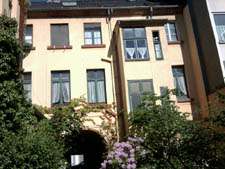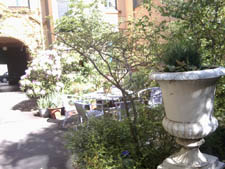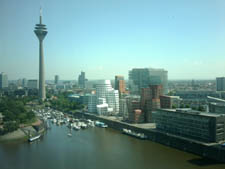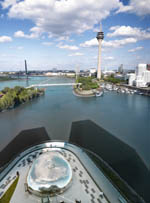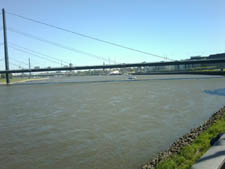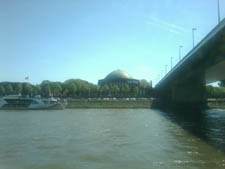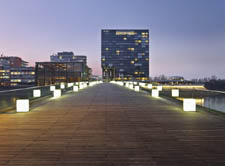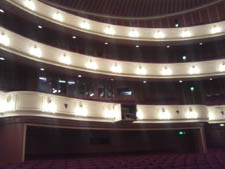> [Archived] Chronicles
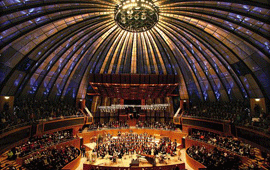
Schumann Festival in Düsseldorf 2012 - Traveller's Log
I arrived in Düsseldorf on 24th May, 2012. It was a sunny Thursday, which I fully enjoyed after enduring the endlessly rainy days in Bucharest.
Everytime I visit a new place - and it was the first time I visited Düsseldorf - I'm trying to get a basic first impression about the city's normal life. Here, I was surprised by the calmness we only see in Bucharest on a weekend day.
The purpose of the travel was obvious: to witness the opening of the Schumann Festival in Düsseldorf, which, this year, takes place between 24th May and 4th June. Düsseldorf, the city of the Rhine riverbank, situated only 40 km from Köln, enjoys the memory of the four years Schumann spent there - between 1850 and 1854, the last one being when Schumann left voluntarily for Einsenstadt, near Bonn, to a phychiatric hospital.
From the Taxi… Into the Concert Hall
The taxi left me in front of the hotel the organizers have picked for me: Hyatt Regency Düsseldorf, the newest five star hotel in the city, located on a peninsula on the Rhine, with a spectacular view of the entire city.
The nineteen story high hotel overlooks the Media - Medienhafen harbour, the old Rhine harbour in Düsseldorf, unrigged today, and a new office buildings neighbourhood, with some spectacular architecture. But, in memory of the harbour, the old cranes and train tracks are craftly incorporated in the modern urban architecture.
One hour later after I had checked into the hotel, I had a meeting with the festival organizers and with the marketing person in charge of the turism in Düsseldorf. We quickly reviewed the schedule for the day - I had two interviews at Tonhalle - the main concert hall in Düsseldorf and one of the places where the Schumann Festival will take place, with first chair violinist from the Emerson Quartet - Eugene Drucker, and then with conductor Ariel Zuckermann, who was conducting the ensemble I knew from last year's edition of the Enescu Festival in Bucharest - Camerata Salzburg.
And, naturally, the concert, at 8 p.m. in the evening.
Düsseldorf's Turist Attraction
I could not miss the opportunity to find out more about Düsseldorf's turist attraction, a city which is not yet one of the favourite weekend spots in Germany, but which is on its way to becoming one. Since Düsseldorf is home to one of the best art academies in the world and one of the best music schools in Germany, the interest for culture, art and music especially, is very high. In the city's numerous art museums one can find things to suit any taste - from the great classics to today's avant-garde. Actually, I went to see an extraordinary exhibition 'El Greco and the Modernists' of which I will tell you about in the following days.
Düsseldorf is also the home of the 'Robert Schumann' Music College - one of the most prestigious musical schools in Germany, where, I was proud to learn that, at the moment, Romanian students are enrolled - guitarist Mircea Gogoncea is one of them.
Düsseldorf, with its old city - Altstadt - is a perfect weekend destination for those who love spectacular nature, with the Rhine flowing rapidly to the north, with a pleasant social life (this side of Düsseldorf is also funnily called the longest bar in the world) and with cultural events on every street corner. A city practically destroyed during the Second World War, and which today is an important business center for the fashion world - the most important brands have offices and stores here, and at the same time, a vibrant cultural destination, in trend with today's tastes. And if we were to add that here is the starting point of the cruises on the Rhine river, we have the perfect picture for a weekend destination.
At Tonhalle
After a long walk through the city's old center, I reached Tonhalle, the biggest and the most important concert hall in the city, with a distinct architecture. The buiding was erected in 1926 as part of a complex where a world exhibition was displayed - it was a Planetarium and the high ceiling on which stars spark is just as amazing today. Now a concert hall with almost 2000 seats, Tonhalle required acoustic investments, which were successfully finalized.
I was led into a rehearsal room. I was about to interview Eugene Drucker, first chair violinist of the Emerson Quartet, which in my opinion, is one of the best string quartets in the world. And I am not refering to the signs of this recognition, I mean - for example, the ten Grammy Awards received during the 35-year career, two for the Best Classical Album - the Emerson Quartet is the only chamber ensemble in the world with such track record.
So, I was, of course, very nervous. I knew some of the recordings of the Emerson Quartet - I had even presented for Radio Romania Music their last Grammy winning album - Intimate Letters - with works by Janáèek and Martinù. I also knew that the Emerson Quartet was a guest at the Enescu Festival - they held a recital at the Atheneum on 6th September, 2005.
Eugene Drucker: We were very impressed with the festival in itself, we were treated very well. I and the other violinist in the quartet, Philip Setzer, had as a student, at the Hartford University where I teach, a violinist from Romania, Irina Gruia. She came back to Romania and, in 2005, when we performed in Bucharest, she invited us to a restaurant where folk music was playing and there was also dancing. Which was vey important for us. We, of course, love the music in Eastern Europe and I think that, although some people might not agree with me, the most interesting folk music is in Eastern Europe. Perhaps that is why I love Bartók's music so much, for me he is the greatest composer of the 20th century and the research he did in the field of ethnomusicology is amazing.
Of course, we could not avoid talking about Eugene Drucker, the Emerson Quartet first chair violinist, relationships with Romanian musicians.
Eugene Drucker: Radu Lupu is Romanian. I've met him once. I was at a reception after a recital with Barbara Hendricks at Montreux, where Radu Lupu was also invited. Since CD's have appeared - and it happened a while ago - I have been collecting them. I have a CD with Brahms Sonnatas performed by Radu Lupu, pieces I didn't really know from any other source. And this is how I learned them, by listening to Radu Lupu's recordings.
Other Romanian performers: Dinu Lipatti, who was a wonderful musician.
One does not always have the chance to talk to a performer who has ten Grammy Awards, so it was only natural that I wanted to know what it really meant to win those coveted awards.
Eugene Drucker: I think the Grammy Awards were useful in promoting our work and the number of awards we gathered over the years helped us sell more CD's, and perhaps, get better paid. It's hard to say, it all comes down to a continuum in one's career. But talking about it from a matter-of-fact point of view, I can say that more people know about the Grammy awards than they know about classical music. In New York, for example, if a worker comes into my house to get something done and sees the Grammy Awards on the shelf, he is very impressed. But sometimes I tell my wife that maybe I shouldn't display my awards, because if people see them, they imagine I have a lot of money, that I am a Grammy winner pop singer.
I believe the tendency is to give Grammy Awards to 20th century classical or contemporary music albums. But we have won Grammy Awards with quartets by Beethoven and Mendelssohn. What I believed impressed them in Mendelssohn was that we recorded the Octet (String Octet in E flat major, Op. 20) ourselves, I mean we overlayed two recordings, which is very unusual in classical music.
Eugene Drucker, first chair violinist of the Emerson Quartet, also told me about his book, The Saviour, reviewed by Victor Eschkenazy in 2007, for the magazine 'Cultural Suplement', a fiction book that has music at its center. Just as the author confessed, the action is based on the real story his father lived, who emigrated to the United States of America from Germany during the Third Reich, leaving behind his lover, Romanian Marieta Lupu, whom he never saw again, but whom Eugene Drucker met in Israel, sixty years after the events narrated in the book.
A Surprise Filled Interview - Conductor Ariel Zukermann
After the interview with Eugene Drucker, I waited for conductor Ariel Zukermann to finish the rehearsal from the Tonhalle in Düsseldorf with the Camerata Salzburg. The organizers warned me that Zukermann particularly wished to speak to me, because his parents are from Romania, but the next statement caught me completely by surprise.
Ariel Zukermann: Good evening. Thank you very much. I don't speak so well. I understand everything. My parents are from Romania, from Bucharest and I lived [there] when I was a child… and I came once at a flute competition in Romania - this was in '99 I think. I really like Romania and its people… I went there for two weeks and I want to go back. For me, it's my heart.
This was the greating of conductor Ariel Zukermann, told on the evening of 24th May at Tonhalle in Düsseldorf. A 39 years old conductor, born in Israel, whose parents left Romania, a musician who studied in Germany and Sweden and who has a very beautiful career conducting important orchestras, like the Camerata Salzburg, that he was about to conduct in Düsseldorf and which we had the opportunity to hear perform in 2011 during the Enescu Festival.
All through my journey in Düsseldorf I felt I was walking proud in the footsteps of Romanians or people linked with Romania, it seemed that everyone had even a remote connection with Romania. And if we are accustomed to be embarrassed by the inappropriated gestures of some of our compatriots who do not honour their country when abroad, this time I felt exactly the opposite, because Romanian musicians are very respected and, I believe, they represent some of the best ambassadors, even if only culturaly, Romania has to offer.
Talking About the Opening Concert on 24th May, 2012
I finished the interview with Ariel Zukermann only minutes before the beginning of the opening concert of the Tonhalle stage. We are talking again about the Schumann Festival in Düsseldorf, which is between 24th May and 4th June and I listened to its first two concerts on the spot, at the invitation of the organizers.
A concert entitled 'A Transatlantic Uverture' because Michael Becker, intendent of the festival, reunited Schumann's music with that of American composers in an evening that followed the pattern of the concerts during Schumann's time - a concert marked out by two large intervals, in which the audience had the chance to socialize, and with a diverse programme, not only regarding the pieces played but also the performers.
The first part of the programme from 24th May from Düsseldorf meant Op. 44, Piano Quintet in E flat by Robert Schumann, performed by Emerson Quartet and pianist Tsimon Barto. I knew from the interview with Eugene Drucker - first chair violinist - that there were different opinions regading the performance, something that was also noticible on stage - the pianist seemed visibly more hurried and more nervous in his interpretation that the members of the quartet who seemed closer to the spirit of Schumann's music. After the first interval, the Emerson Quartet simply mesmerized the hall with the Movement 2 of String Quartet by Samuel Barber - the famous Adagio, which the four musicians performed standing up, which is actually a distinctive trait of the Emerson Quartet recitals.
Percussionist Martin Grubinger
Next on stage, was the performer I was most interested in seeing here at Düsseldorf: 29 years old percussionist Martin Grubinger, whom I have known from his Drums'n'chant record which I have played, for the first time, at Radio Romania Music. And he had met my expectations: I have listened and I have seen - which is also very important - a spectacular musician, wholly commited to his art, who simply electrified the hall with a novel percussion and chamber orchestra concert by John Corigliano, concert entitled The Conjurer. A contemporary, accessible piece, with its irregularities, but very much alive and in which the percussion instruments are displayed in groups of three: first wood, then metal, them membrane. It was a well deserved success for all the people on stage: Martin Grubinger, Camerata Salzburg and Ariel Zukermann, the last one managing superbly the whole musical evolution, which was not so easy to conduct.
After the second interval, the third part of the concert debuted with the Hermann und Dorothea overture by Robert Schumann, a piece composed by Schumann in Düsseldorf, but not one of his masterpieces. And as a closing act, a remake for percussion and orchestra by Martin Grubinger senior for the West Side Story suite by Leonard Bernstein - again with Martin Grubinger at the forefront - remake that literally had the audience standing, first by the entertaining music, then by the surprising percussion and orchestra arrangement and last but not least because of the exceptional quality of the performance.
The audience demanded an encore, and was soon satisfied, a fantasy on famous themes also by Berstein, with a surprising vocal intervention by one of the members of the orchestra, a constrabass player.
And this is how 24th May ended in Düsseldorf.
Second Day of the Schumann Festival in Düsseldorf
25th May began with a tour of the hotel where I was accommodated by the organizers - the newest five star hotel in the city, Hyatt Regency Düsseldorf, inaugurated a year and a half ago. What I found extraordinary at this hotel, beyond its exceptional housing capabilities, its tasteful minimalist design, its incredible location right on the Rhine riverbank and the spatious and highly equipped SPA center, was that on its roof there were no less than 40.000 beehives, their honey being served to the hotel's guests. Quite interesting, don't you think?
On 25th May, at 12 p.m. I had scheduled the interview with Michael Becker, the intendent of the Schumann Festival and of the Tonhalle in Düsseldorf. Inevitably, we talked about Romanians, because also in the Düsseldorf Symphony Orchestra are a lot of Romanians.
Michael Becker: Yes, and there is also one you would not say he's Romanian, but he is. I'm talking about Robert Schumann, a wonderful violinist, Robert Schumann from Romania.
We also have cellist Valentin Radutiu in the festival programme, he was born in München. Even my sister-in-law was born in Romania.
Romania is special not because it is a Slavonian country, but, perhaps of the communist regime, it has a musical school very well developed, a very good musical education system. This is the first impression: Romanian musicians handle their instruments very well. Also, it is important that those who come from countries that are not known as first class cultural centres before the First World War, to have a special sense of pride in their folk music. I believe that those who do not come from Central Europe have the best chances now - and I'm talking about countries like Finland, for example, because they have a musical ear, they understand music in a certain way; they don't have to carry on their shoulders the legacy of a past. They are very talented, they receive a violin and they play and are good at it. This is what is missing from Germany right now and from German education. If we are to look at the quality of the Romanian performers of the last 100 years, let's say, we have Radu Lupu, Clara Haskil, Dinu Lipatti - especially pianists - there is such a good musical quality, they are so stirring. Germans can be very jealous sometimes. And it's a fact: you are that good.
At the Opernhaus Düsseldorf
After such emotional testimonies, I did not expect my itinerary on Romanian tracks in Düsseldorf to have any more surprises in store for me, but I was wrong.
Luiza Fatyol: My name is Luiza Fatyol, I'm 24, soon 25 years old, and I'm part of the Opera Studio of the Deutsche Opera Düsseldorf. Last April Mr. Maier, the intendent, the general-director and the artistic director Steven Harison came to Romania for an audition for the Opera Studio. The Opera Studio is like a training session for what comes next, for your career. We have small parts on the big stage; we also have parts in the performances for children, even title roles. We have masterclass with famous people, famous singers which is a very good thing. We all worked here with David Syrus, a very good pianist from the Covent Garden and with Deborah Polaski, and I understood that next year we will have the opportunity to work with a few more. We have a two year contract; we are the third or forth group of the Opera Studio, and once every two years they renew the group. We were seven chosen this year, out of which four Romanians. We have a colleague who is a tenor, Ovidiu Purcel, a baritone, Bogdan Baciu.
Attila Fodre: My name is Fodre Attila, I'm 25 years old and I graduated from the "Gheorghe Dima"Music Academy in Cluj-Napoca. Actually we are all from Cluj. The audition was in Cluj. They've chosen me from the choir. I sang in the opera choir.
I've discovered Luiza Fatyol and Attila Fodre at the Opernhaus Düsseldorf, which I have visited accompanied by a wonderful guide of the 'We Like Music' tour. Two Romanian performers who are building their careers here, and who are very appreciated, two voices with which I believe we will be proud in the near future.
If you have the chance, it is well worth it to see a show at the Opernhaus Düsseldorf - very diverse repertoire, less known, and besides opera, there are inciting ballet shows, of which the people here are very proud of.
At the Restaurant
Inevitably, each of us had to eat so I didn't miss the culinary experience Düsseldorf had to offer. 'Monkeys' was recommended - which is actually a triple restaurant. I've talked to the young owner of the business, who inherited the restaurants from his father and he gave me further details. In the area of a square there is 'Monkey West' with European specialities, the most stylish restaurant of the three, a place where art meets gastronomy because inside one can admire the sculptures and the paintings of a known German artist. Actually the monkeys were the symbol of this artist because of man's ever changing nature. 'Monkey East' is a restaurant with Asian specialities where I also savoured some wonderful shrimps rolls and 'Monkey South' is a restaurant with Mediteranean specialities. I asked the owner what type of dishes he would recommend in each of the three restaurants: lasagne in the 'South', sushi in the "East' and any dish with sparaghel in the 'West'. The owner's favourite restaurant: the 'South' which came as no surprise because I have noticed that germans love, in general, the Mediteranean cuisine.
Recital on 25th May
The evening of the 25th May ended in the Robert Schumann hall of the Art Museum in Düsseldorf, with the recital of the pianist Tsimon Barto. I will not elaborate on this moment because I have to admit I did not enjoy the performance of the American known for his excentricity: he is also a bodybuilder and he speaks six languages, ancient Greek and Latin among them, something which apparently does not help him to play piano better. There were two and a half boring hours, with Haydn, Liszt, Schumann and Brahms, stylistically sounding the same.
…And the Last Day
And my last day in Düsseldorf, 26th May also arrived. I did not want to miss an exhibition which proved to be highly interesting: 'El Greco and the Modernists': forty paintings by El Greco gathered from museums and collections from the entire world and other 140 paintings by expresionists inspired by El Greco. It's unsettling to see how, actually nothing is new, because El Greco's last paintings are very similar to the modernists art, even though they were painted 400 years ago. The exhibition is opened until 12th August, so if you come to Düsseldorf, and I hope you will, if you can, don't miss this unique and totally novel exhibition.
And Thank You
Translated by Florina Sãmulescu
MTTLC, Bucharest University




